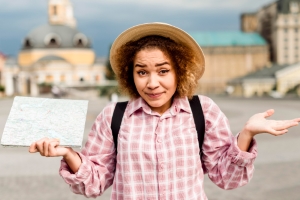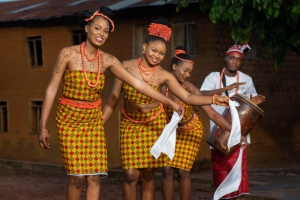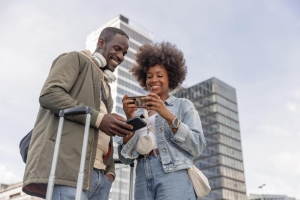Botswana is a breathtaking destination known for its rich wildlife, stunning landscapes, and welcoming people. Whether you’re visiting for an exciting safari adventure, cultural exploration, or a peaceful retreat, it’s essential to know what to expect. From the climate and transportation to food, safety, and local customs, here’s a comprehensive guide to help you prepare for your trip.
1. Warm Hospitality & Friendly Locals
Botswana is known for its friendly and welcoming people. The locals, primarily from the Tswana ethnic group, place a high value on respect and politeness. Greetings are important, so take the time to say:
- “Dumela” (Hello)
- “O kae?” (How are you?)
Showing effort in speaking a little Setswana is always appreciated. People are generally warm and eager to assist travelers, especially in rural areas.
💡 Tip: It’s polite to greet shopkeepers, taxi drivers, and locals before asking a question or making a request.
2. Wildlife & Safari Experiences
Botswana is one of Africa’s top safari destinations, home to some of the most untouched wilderness areas in the world. Expect to see elephants, lions, leopards, rhinos, hippos, and more in their natural habitats.
Top safari destinations include:
- Okavango Delta – A UNESCO World Heritage Site offering mokoro (canoe) safaris and incredible wildlife sightings.
- Chobe National Park – Famous for its large elephant herds and boat safaris along the Chobe River.
- Moremi Game Reserve – Offers some of the best game viewing in Africa.
- Central Kalahari Game Reserve – Home to the San (Bushmen) people and unique desert-adapted wildlife.
Most safaris involve game drives in 4×4 vehicles, boat cruises, or walking safaris with expert guides. Expect early mornings and stunning sunsets over the African bush.
💡 Tip: Safaris can be expensive, but self-drive options in national parks provide a budget-friendly way to experience Botswana’s wildlife.
3. The Climate: Hot Days & Cool Nights
Botswana has a semi-arid climate, meaning it can get extremely hot during the day but cool down significantly at night.
- Dry season (May–October): Best time for safaris; clear skies, cool mornings, and warm afternoons.
- Wet season (November–April): Hotter temperatures, occasional heavy rains, and lush green landscapes.
Expect high temperatures, especially in the Kalahari Desert, where it can get scorching in summer but quite cold at night.
💡 Tip: Pack light clothing for the day, but bring a warm jacket for cool evenings, especially if visiting during winter (June–August).
4. Transportation: Getting Around Botswana
Botswana has well-maintained roads, but much of the country is covered in remote wilderness, so getting around can be challenging.
- Flights: Charter flights are common for reaching safari lodges and remote areas like the Okavango Delta.
- Buses & Public Transport: Available between major towns but not reliable for remote destinations.
- Car Rentals: A 4×4 vehicle is essential for self-driving safaris or visiting national parks.
- Taxis: Available in cities like Gaborone and Maun, but always agree on the price before getting in.
💡 Tip: If planning a self-drive safari, research the road conditions and carry extra fuel and supplies.
5. Currency & Payment Methods
The official currency is the Botswana Pula (BWP). Credit cards are widely accepted in cities and lodges, but cash is needed for small towns, markets, and some fuel stations.
- ATMs are available in major towns but may not work in remote areas.
- Tipping is not mandatory, but appreciated in restaurants, hotels, and for tour guides.
- The exchange rate varies, so check current rates before traveling.
💡 Tip: Carry small denominations of cash for tips, markets, and taxis.
6. Safety & Health Considerations
Botswana is one of the safest countries in Africa, with low crime rates, especially in tourist areas. However, take basic precautions:
- Avoid walking alone at night in cities.
- Keep valuables out of sight.
- Beware of wild animals—never walk outside designated areas in game reserves.
Health-wise:
- Malaria is a risk in the north (Okavango Delta, Chobe, etc.), so take preventive medication and use mosquito repellent.
- Tap water is safe to drink in cities but bottled water is recommended in rural areas.
- Travel insurance is highly recommended, especially for safaris and medical emergencies.
💡 Tip: Always listen to your guide’s instructions when on safari to stay safe from wildlife.
7. Food & Cuisine: A Taste of Botswana
Botswana’s cuisine is simple, hearty, and influenced by local ingredients. Expect dishes like:
- Seswaa – Shredded beef or goat meat, slow-cooked and served with pap (maize porridge).
- Bogobe – A traditional sorghum porridge.
- Vetkoek – Deep-fried dough filled with meat or jam.
- Fresh game meat – Such as ostrich, kudu, and impala, often served in lodges.
Most international foods are available in cities, but rural areas focus on traditional dishes.
💡 Tip: Try local food at markets and small eateries for an authentic experience.
8. Culture & Local Etiquette
Botswana has a deeply respectful culture, and certain customs should be followed:
- Always greet people before asking a question or starting a conversation.
- Avoid pointing at people with one finger—use your whole hand.
- Dress modestly in rural areas, especially for women.
- Public displays of affection (PDA) are frowned upon.
- Asking for permission before taking photos of locals or villages is polite.
💡 Tip: Learning a few Setswana phrases can go a long way in showing respect.
9. Unique Experiences Beyond Safari
While Botswana is famous for its wildlife, there’s much more to explore:
- Meet the San (Bushmen): Learn ancient survival skills from Botswana’s indigenous people in the Kalahari.
- Visit Tsodilo Hills: A UNESCO World Heritage Site with ancient rock paintings.
- Explore the Makgadikgadi Pans: A vast, lunar-like salt flat with meerkats and quad biking adventures.
- Boat safaris in Chobe: A different way to see wildlife up close.
💡 Tip: Add a cultural experience to your itinerary for a well-rounded trip.
10. Internet & Connectivity
Botswana has decent internet coverage, but rural areas and safari lodges may have limited or no connectivity.
- Wi-Fi is available in hotels, cafes, and lodges in major towns.
- Local SIM cards (Mascom, Orange, BTC) offer affordable data.
- Remote safari camps often don’t have Wi-Fi, so prepare for a digital detox.
💡 Tip: Download maps, books, and entertainment before heading into the wilderness.
Final Thoughts: Botswana is Worth the Visit!
Botswana is a dream destination for travelers who love nature, wildlife, and cultural experiences. Whether you’re exploring the Okavango Delta, meeting the San people, or enjoying the friendly atmosphere, expect a well-organized, safe, and unforgettable trip.
Now that you know what to expect, all that’s left is to pack your bags and experience Botswana for yourself!







